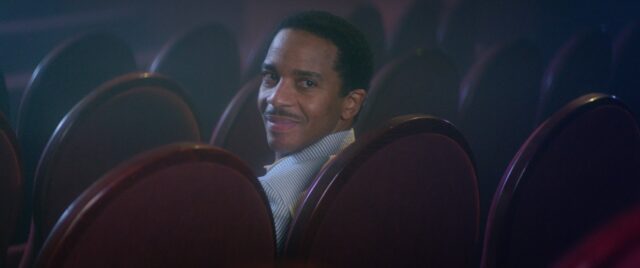André Holland knew he had to land the role of Paul Cole, the mysterious, debonair, multifaceted man without a past at the heart of The Actor, the film based on Donald E. Westlake’s hard-boiled pulp fiction novel “Memory.” Paul, stricken with amnesia, wakes up in a small 1950s town with a serious head injury and no recollection of who he is or how he got there. Strapped for cash and short on clues, he begins working in a nearby tannery and attempts to put the pieces of his life back together again, a quest that not everyone he encounters offers to support — except for her. The moment Paul laid eyes on Edna (Gemma Chan), things changed: the future didn’t appear so terrifying in its uncertainty anymore. Rather, it seemed limitless. She sees something in him, too — a person who doesn’t need to be defined by his past. Still, a surreal sense of nostalgia clings tightly to Paul, and existential inquiries loom just overhead like dark clouds blotting out the sun.
Helmed by Anomalisa director Duke Johnson and produced by Charlie Kaufman, The Actor finally presents the extraordinary Holland with a weighty opportunity to truly carry a film on his back, and in turn, he finds a source of strength within himself not unlike that of his character onscreen.
Drawn to the role in part because of the rare opportunity it presented, Holland was initially intrigued by the notion of an off-kilter crime drama centered around an African American man. “Ryan Gosling had been attached to play the lead, and for whatever reason, he was no longer able to do it,” explains Holland over the phone from New York, where he was preparing for his premiere at the Village East by Angelika. “One could imagine a movie like this existing with Ryan Gosling, but to see a Black man have a role like this, in a movie like this, to me, felt really special. I wanted to be a part of that.”
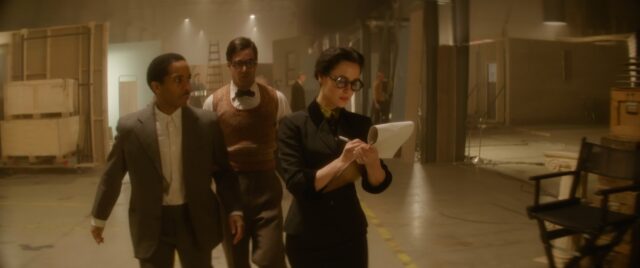
Holland is the kind of actor who’s previously been lauded for disappearing into his incredibly impressive supporting roles, selflessly elevating his co-stars to new heights in defiantly uncategorizable additions. This is perhaps why, after over a decade in the business, it’s only relatively recently that he’s become the big household name worthy of his prowess. Still, the run he’s had in recent years is pretty astonishing, appearing as a fated love interest in Barry Jenkins’s Moonlight, an underestimated surgeon seeking to rise above his station during the 1900s in The Knick, a crucial sportswriter who acts as a guide and confidante to sports legend Jackie Robinson in 42, a voice of much-needed reason in Ava DuVernay’s Selma, a doting father to an afflicted child in Luca Guadagnino’s Bones and All, and a loving husband to Tessa Thompson in Rebecca Hall’s bold exploration of racial inequality, Passing. More recently, he took on the title of the titular painter Tarrell in Titus Kaphar’s semi-autobiographical musing on generational healing in Exhibiting Forgiveness, but The Actor offers the star in waiting the chance to be seen in nearly every single frame of the movie, almost like a one-man-show.
“It’s so, so up my alley, in terms of the theatricality of it,” Holland states excitedly. “Also, it being this meditation on identity, all of those things that I love. For me, I was like, ‘I’m all in, if you guys want me.”
In the film, Paul slowly unearths the remains of his past and learns that previously, he was an accomplished stage actor in New York. “I just love that he’s little by little, getting this information about who he might’ve been, and then when it comes to the place we realize that the person that he was, was probably not such a good person, or certainly hurt people, or did things that he’s not proud of,” says Holland. “Even still, he has a choice to make, whether to go back to that life or to move forward from the place that he finds himself. And I think there’s something very beautiful about this idea of starting over.” He continues, “Even in a global, political sense, the outcomes that we’re seeing aren’t necessarily inevitable. We can stop, and revise, and make different choices.”
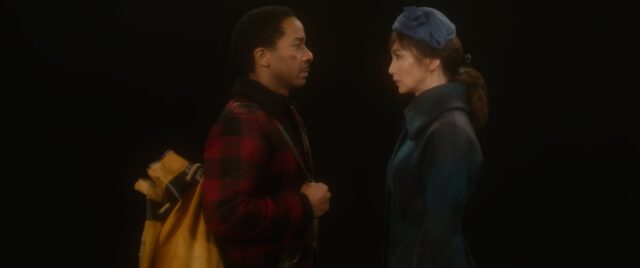
Holland boasts a striking similarity to his character onscreen, as he too knew from an early age that he belonged on the stage. Born in Bessemer, Alabama, a southwestern suburb of Birmingham, Holland grew up watching his grandfather preach at the local Pentecostal Church, and understood, from an early age, the harnessing power of performance. Although his house didn’t host a ton of television, the spark stirred within him was further fueled by his favorite pastime. Walking through the woods to his aunt’s house, he and his family used to sit around a fire barrel and listen to the elderly tell stories. When Holland’s mother, Mary, enrolled her son in drama, singing and dance classes, mainly as a way to keep the young boy out of trouble (the neighborhood he grew up in came with its own set of distractions), she inadvertently set in motion a path for her son that he would continue on well into adulthood.
Nearing his high school graduation without any solid plans set in stone, one of Holland’s drama teachers saw the potential in his student and suggested that he pursue acting as a career, which Holland had not realized, up until that point, was even an option. Following the teacher’s recommendation, Holland attended Florida State University, which is considered one of the leading comprehensive theater training programs in the country. Hustling to stay in the program, he earned a scholarship after his family’s savings were tapped his freshmen year, before continuing on to New York University, where he gained an MFA.
From there, Holland dove wholeheartedly into the world of theater, appearing on Broadway in Joe Turner’s Come and Gone at the Lincoln Center Revival, and in Jitney in the Manhattan Theatre Club Original Broadway Production, in addition to Off-Broadway acts like The Whipping Man, Wig Out!, and In The Red and Brown Water at Georgia’s Alliance Theatre. He even took on Shakespeare in the Park in public theater productions like Much Ado About Nothing, As You Like It and All’s Well That Ends Well.
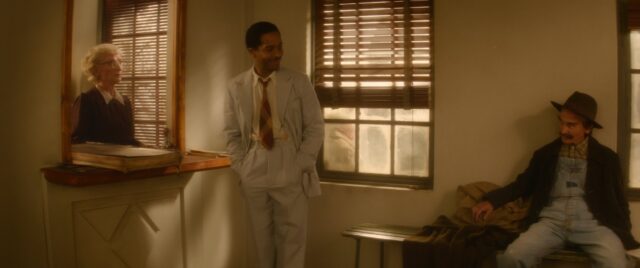
Considering his background, in many ways, encompassing a role where he is required to play an accomplished stage actor almost feels predestined. “I think that there is something pulling me towards different projects,” Holland admits. “It does feel like there’s a path. Sometimes, I find myself not trusting it entirely, and feeling frustrated with things taking too long, or, you know, ‘Why has this not happened quicker for me?’ or ‘Why am I not getting better opportunities?’ But when I look back on it, I think it’s true that there does seem to be an order to it. I feel a little bit like Paul in the sense that when I look at what’s coming next, sometimes I struggle. That picture is really fuzzy.”
Many of the actors Holland knows have very clear and concise checklists when it comes to their ideas about which directors they’d prefer to work with, or the exact type of movies they’re aiming to make. Holland, however, relies more on his own intuition. “I think I’m just as curious as Paul as to what’s gonna come next. Some days, I’m excited about it. I’m like, man, anything is possible, and I think that something really wonderful is gonna be down the road. But there are days when I feel less enthusiastic, or optimistic, and I worry about what’s coming next.” A true Shakespearian connoisseur, he notes, “It’s what happens in divinity that shapes our ends.”
Driven by the challenge that each individual project presents to him, Holland is a performer in constant pursuit of the potential for growth. “I probably should pick an easier one sometimes, but I think I’m a glutton for punishment,” he jokes. “In this one, I knew it was hard, it was hard because he’s a character who doesn’t know anything about himself.” Holland prefers to work by asking basic questions about the character he’s signed on to play: Who is he? Where is he? What does he want? Using this method, he builds a backstory that he can lean on as an actor to inform the scenes in the present. “But we didn’t have any of that at our disposal,” he explains, “So when I read it, I thought, man, I actually don’t know how to do this. Like, I don’t know how to do it in a way where it doesn’t feel like you’re just playing the same beat over and over again. It’s like, ‘Well, I don’t know, and ‘I’m confused,’ but to try to find a way to make you feel active.”
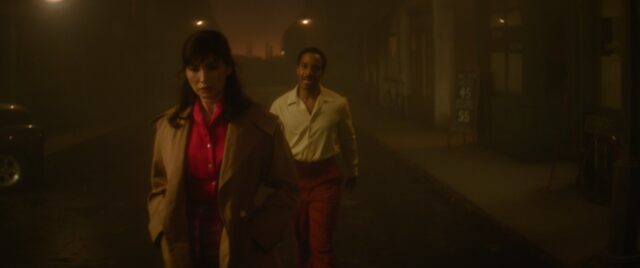
On another level, at the time that Holland’s producer and longtime friend Abigail Spencer pitched him the offer for The Actor, he was facing his own empirical battles. “I’d just lost my dad a few months prior, so I’m still processing that, and I think questions like, ‘Who am I really?’ were things that were coming up for me, personally,” says Holland. “It’s funny how art and life tend to influence each other in that way. I think I probably needed that part, and the experience of doing the part, as much as it needed me. I’m grateful for it.” Holland’s father, Donald, was always one of his son’s biggest supporters. “I’m trying to work hard to try and make him proud, but I’m so incredibly proud of him,” reflects Holland. “He’s such a special man. I wouldn’t be doing any of this if not for him.”
In The Actor, not long after he gains a position in the shipping department at the tannery, Paul makes an important connection. “When I first read the script, this thing that really jumped out to me the most was the moment where he met Edna,” Holland remembers. “There was something about that little love story that happens in the middle of the movie that just deeply moved me. This guy who doesn’t know anything about himself meets somebody who sees something in him that he isn’t able to see himself — see a goodness in him, more kindness in him that he’s lost sight of — that that person is willing to hold space for him, and that for a moment, there’s this beautiful possibility between the two of them. That really touched me.” He laughs, “Maybe that’s the romantic in me that’s always hoping that such things are still possible, but I just thought that was such a beautiful touch. Then, when Gemma got on board, I couldn’t think of anybody better to play that part than her. And I mean, the fact that these two characters were gonna be actors of color was really special to me, and I think that says a lot about who Duke is as a director.”
Caught in a warm, hazy glow, Chan’s Edna first appears to Paul in a clown costume at a Halloween party, and immediately, sparks fly. “I think with Gem, I definitely can feel when there is that alchemy, that chemistry between actors,” says Holland. “Sometimes you work with other people that aren’t really open to playing. Sometimes actors decide what they want to do ahead of time, and then nothing you do or say can knock them off of that track. That’s when it feels less fun. That’s when it starts to feel like work. But with Gemma, from the very beginning, she approached it with an openness and a curiosity, which for me, made it feel safe, because I also was curious and open, and didn’t have all the answers. I think work-wise, it was really a joy, for that reason. We were able to really get somewhere together — and in a short amount of time! We didn’t have a whole bunch of rehearsals. We all parachuted in and worked a little bit, and then before you knew it, we were going. And I think we built a real intimacy together.”
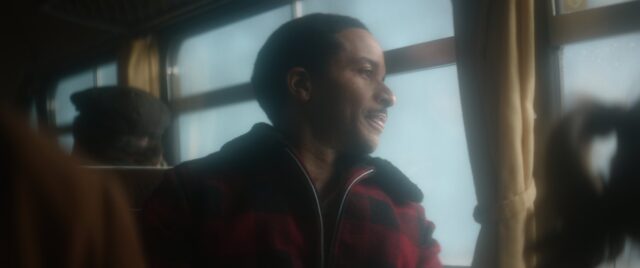
What starts as a gritty detective noir quickly morphs into something more. Although the movie begins in black and white, it swiftly switches to color. Like The Wizard of Oz, many of the cast members appear onscreen in multiple roles. A steam-filled hue sweetly glazes over much of the frame. A fiery, upbeat energy, not unlike jazz, permeates the rhythm of the story, filling the film with unnatural momentum and making moments appear seemingly out of thin air, like magic. Further pulling the viewer down the Kafka-esque rabbit hole director Johnson has constructed, Paul and Edna come together for a dreamy dance sequence, which begins at the bar where they first meet, and then melts onto the cobblestone just outside, as the walls are whisked away into the night. Aiming to add a theatrical element, director Johnson constructs an artificial world that makes watching the movie feel just like taking in a play.
“I’m thinking about the scene where Gem and I are dancing in the bar, and suddenly the walls open, and we’re on the street,” says Holland. “We did that practically, on the street, with flats that were brought in and taken out. To me, it adds to the charm of the movie, and also, I think, is aligned with what Paul is going through, in terms of him trying to make sense of the world around him. That world is not one that necessarily fits into any particular genre, but that can bend genre. I think there’s a meta-narrative there that’s really cool.”
One of The Actor’s strong points is that although it stars a mixed-race couple, the commentary doesn’t serve as the centerpiece of the story. The focal point is shifted more to who Paul is, as a character, and his plight to regain his memory. “I feel like that’s one of the reasons I wanted to make Love, Brooklyn, too,” says Holland, referencing an upcoming project that recently premiered at Sundance, “Is because I felt like that was an opportunity to have that world with Black and Brown folks, and not have it be necessarily about race, or to not have it depend on trauma, but just be about people living their lives, and trying to move forward. Watching Black people do that onscreen is a beautiful thing, and something that I think that people wanna witness. With this one, the movie is set in 1955, and there’s a version of the movie you could do where it’s all about race and violence, and what does it mean for this Black man to be traveling through the Midwest at this particular time? I think that movie could also exist, and be great, too, but in this one, what we wanted to do was to let that be there in a way that feels subtle.”
Unique in its approach, the subject matter provides the perfect setting for such open interpretation. As Holland points out, “Paul’s a guy who has forgotten everything. So, I think it’s interesting to think about, well, how does he experience the world if he doesn’t carry the history of racial trauma with him? He just is showing up in the world as a guy, and I like how Duke gives the audience these subtle clues that yeah, race may be a thing that’s factoring into what’s happening here, but also, we’re interested in this guy figuring out who he is on his own terms.”
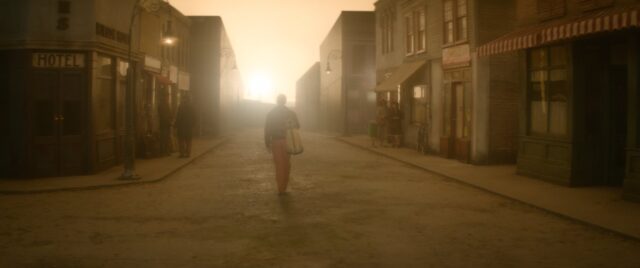
Holland’s experiences collaborating with other filmmakers range from the hands-off approach of Steven Soderbergh (who the actor attributes to weaning him off of his “need for approval”) to DuVernay’s more involved method on sets like A Wrinkle in Time, but working on director Johnson’s movie seems more like an amalgamation of his former repertoire.
“Duke’s great, man,” says Holland. “First of all, it’s really comforting, as an actor, to know that the director really thought through all the beats. He had imagined every frame, every shot, everything, and at the same time, was really open to us, as actors, bringing our own thoughts to it.” Johnson listened to his cast when they made suggestions, even if he already had a clear picture painted in his head of what he planned to accomplish in the following scene. “If somebody had a different idea, or brought a different emotional thing to it, he was open and responsive enough to say, ‘Oh, I like that better than the thing I had, let’s go with that,’ which I think is a real sign of maturity and trust, and it allowed us to go far together.”
Johnson also has a knack for shooting long takes, a habit that tapped into Holland’s deep affection for performing in front of a crowd. “I like feeling like I can go on a bit of a ride. Sometimes I find it frustrating when you have to do things in pieces if you don’t get a sense of what’s happening. Whereas when you do a longer take, I feel like they keep you on your toes, and that’s when you bump into surprises.” Holland, who’s nothing if not thrilled by an aptitude test, points to the added incentive of a difficult task. “There’s a challenge in it that I think makes everybody perk up a little bit. When you know we’re going to do these five pages, and we’re going to use a Steadicam and do it in a oner, everybody knows, ‘Okay, I gotta come with my A-game, and be precise, and pay attention.’ I think that just elevates the whole thing, which is important. I love working that way.”
Breaking out of one’s comfort zone isn’t easy, but it’s hard to grow when there’s no movement. We tend to romanticize what’s come before, simply because it’s more familiar, but it leads to stagnation. For Holland (and possibly, his character, Paul, as well), there’s only one direction in which he’s willing to move: forward.
“I think that letting go is something that I have struggled with, both personally, and also as an artist,” says Holland. “Sometimes, I can get stuck on an idea, or stuck in a situation, and I think this project has taught me that it’s okay to let go. Sometimes through letting go, there are things that become possible that we wouldn’t otherwise see. I think that’s part of the bind that Paul is caught in: wanting to know what’s happened before, wanting to know who he was, and his inability to release those parts of himself, or whatever it is that keeps him from giving himself fully to this new opportunity that’s in front of him. So, I think that’s something that I’ve learned, and then probably will continue to learn, is how to really be present. How to let go of the past mistakes, and just move forward with an open heart, and have the confidence that it’s going to be okay.”
He adds, “I think it’s absolutely possible for him to change, for all of us to change. I would certainly choose to stay and start anew.”
Look for “The Actor” on streaming services soon.

